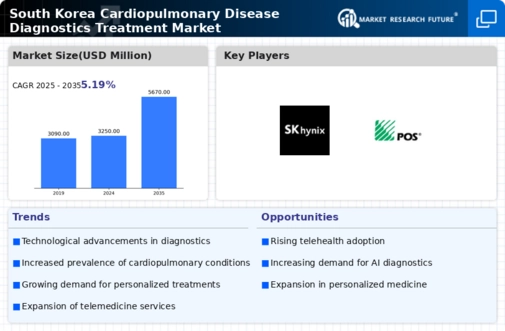Advancements in Diagnostic Technologies
Technological innovations in diagnostic tools are significantly influencing the cardiopulmonary disease-diagnostics-treatment market. The introduction of advanced imaging techniques, such as high-resolution CT scans and MRI, has improved the accuracy of disease detection. Furthermore, the integration of artificial intelligence in diagnostic processes enhances the efficiency and speed of patient assessments. In South Korea, the market for diagnostic imaging is projected to grow at a CAGR of 8% over the next five years. These advancements not only facilitate early detection but also enable personalized treatment plans, thereby driving the overall market forward.
Government Funding and Support Programs
Government initiatives aimed at improving healthcare infrastructure play a pivotal role in the cardiopulmonary disease-diagnostics-treatment market. In South Korea, substantial funding has been allocated to enhance healthcare services, particularly in cardiopulmonary care. Recent reports indicate that the government has increased its healthcare budget by 10% to support innovative treatment methods and diagnostic technologies. This financial backing encourages research and development, fostering a conducive environment for market growth. As a result, healthcare providers are better equipped to offer comprehensive services, which is likely to attract more patients seeking cardiopulmonary care.
Rising Demand for Personalized Medicine
The shift towards personalized medicine is emerging as a significant driver in the cardiopulmonary disease-diagnostics-treatment market. Patients are increasingly seeking tailored treatment plans that cater to their specific health needs. In South Korea, the market for personalized medicine is expected to expand as healthcare providers adopt genomic and biomarker testing to inform treatment decisions. This approach not only enhances treatment efficacy but also improves patient satisfaction. As the healthcare landscape evolves, the demand for personalized diagnostics and therapies is likely to grow, positioning the cardiopulmonary disease-diagnostics-treatment market for substantial advancements.
Growing Awareness and Education Campaigns
Public awareness regarding cardiopulmonary health is on the rise, driven by educational campaigns and health initiatives. In South Korea, organizations are actively promoting the importance of early detection and management of cardiopulmonary diseases. This heightened awareness is leading to increased screening and diagnostic testing, which is beneficial for the cardiopulmonary disease-diagnostics-treatment market. Surveys indicate that around 60% of the population is now more informed about the risks associated with cardiopulmonary conditions. Consequently, this trend is likely to result in a higher demand for diagnostic services and treatment options, further stimulating market growth.
Increasing Prevalence of Cardiopulmonary Diseases
The rising incidence of cardiopulmonary diseases in South Korea is a critical driver for the cardiopulmonary disease-diagnostics-treatment market. Factors such as urbanization, lifestyle changes, and an aging population contribute to this trend. According to recent health statistics, approximately 30% of the adult population is affected by some form of cardiopulmonary condition. This growing patient base necessitates advanced diagnostic and treatment solutions, thereby propelling market growth. Healthcare providers are increasingly investing in innovative technologies to enhance patient outcomes. The demand for effective diagnostics and treatment options is expected to rise, indicating a robust market potential in the coming years.

















Leave a Comment